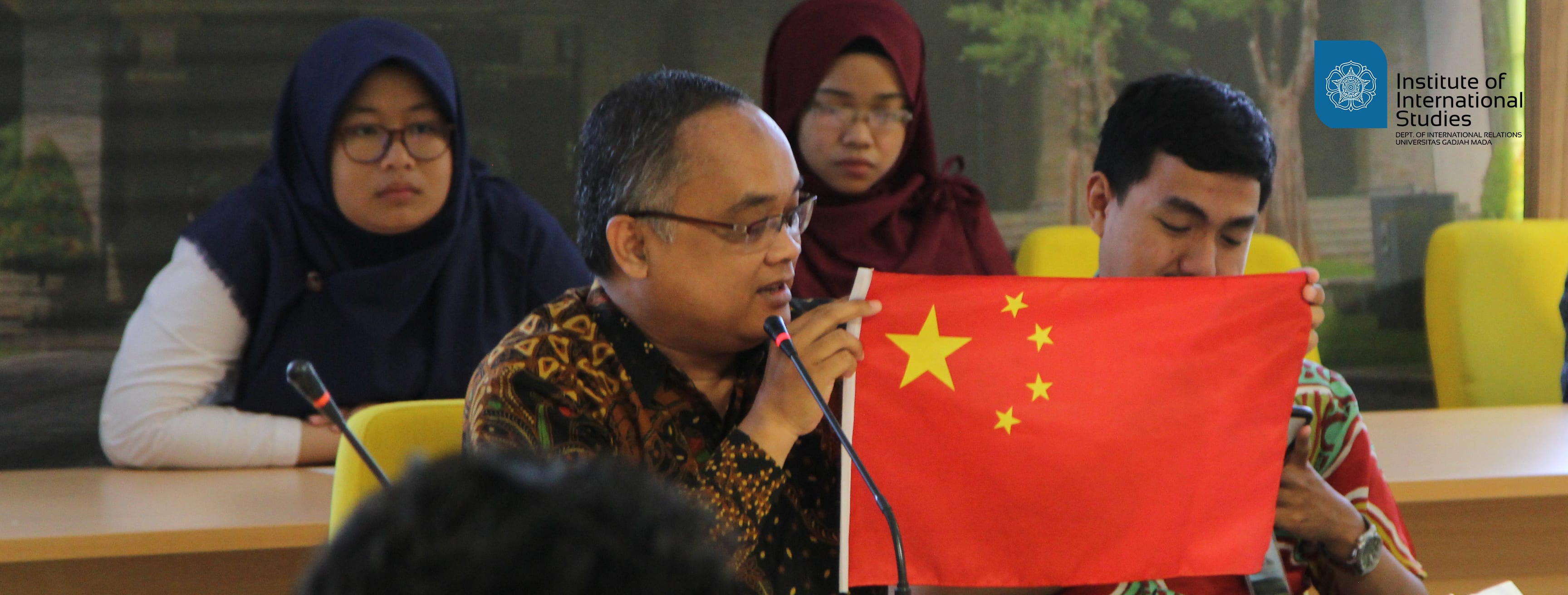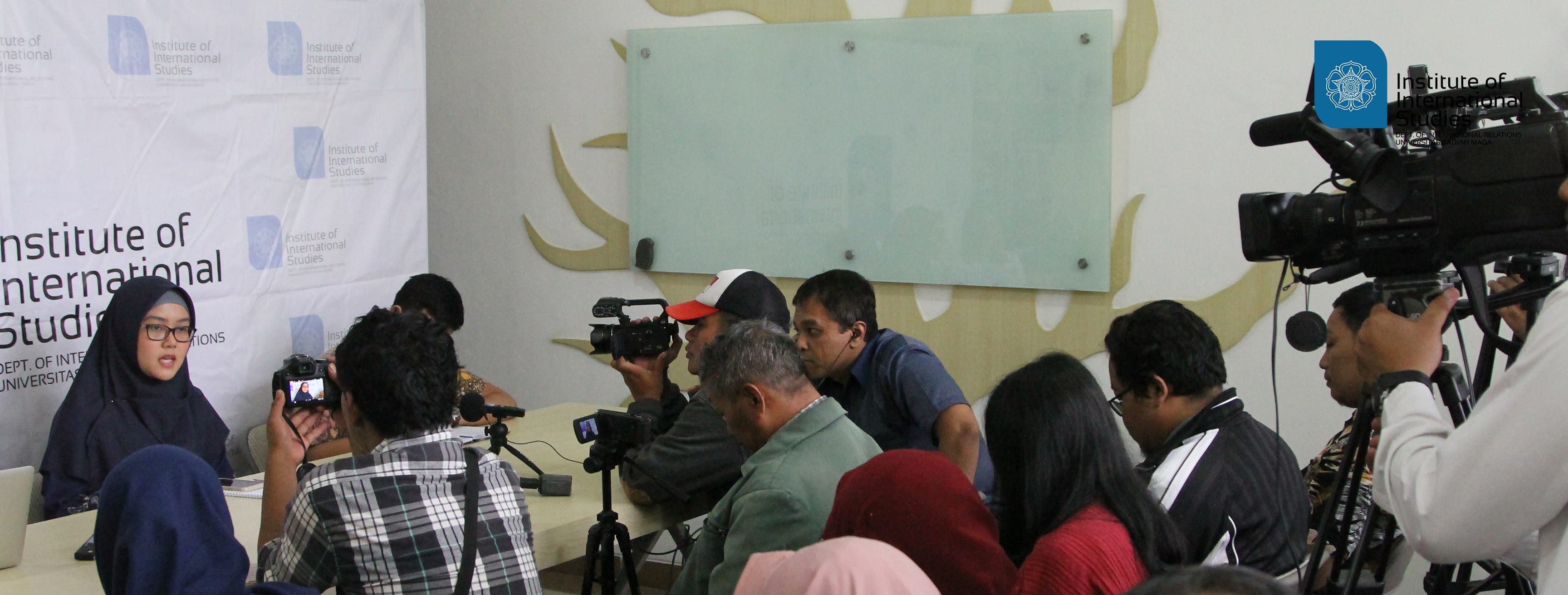Pada 20 November 2020 lalu, Institute of International Studies Universitas Gadjah Mada menyelenggarkan forum Beyond the Great Wall edisi ke-11 secara daring melalui platform Zoom. Bertajuk “The Rise and Future of China’s Power Projection”, forum BTGW kali ini menghadirkan dua pembicara. Pembicara pertama adalah Angelo Wijaya, founder dari Student Association of Belt and Road Initiative (SABRI) Chapter UGM, yang memaparkan review dari buku yang berjudul Destined for War: Can America and China Escape Thucydides’ Trap. Selanjutnya, Demas Nauvarian, mahasiswa S2 Hubungan Internasional di Universitas Airlangga, menyampaikan materinya yang bertajuk “The Evolution of Chinese Geostrategic Thinking and Strategic Culture: From Sea Power to Space Power.” Forum BTGW #11 turut menghadirkan Indrawan Jatmika, staf riset IIS UGM, sebagai moderator.
Membuka forum BTGW ke-11, Angelo Wijaya menyampaikan fakta bahwa dalam waktu dekat, Cina akan menjadi kekuatan nomor satu di dunia karena adanya prediksi bahwa ekonomi Cina di tahun 2024 akan semakin menguat, bahkan mengalahkan Amerika Serikat (AS). Tentu hal ini menjadi ancaman yang serius bagi AS, sehingga pilihan tindakan yang diambil adalah dengan menyatakan berbagai bentuk ketidaksetujuannya dengan Cina, berkompetisi, hingga perang dagang. Buku “Destined for War: Can America and China Escape Thucydides’s Trap” mencoba untuk melengkapi apa yang dikemukakan Thucydides dalam kisah yang sangat legendaris dalam hubungan internasional, yaitu Perang Peloponnesian. Dalam hal ini, Graham Allison memperkenalkan istilah “Thucydides’ Trap”, yaitu tendensi terhadap perang ketika suatu kekuatan baru muncul untuk menggantikan kekuatan yang telah ada sebelumnya. Anggapan ini tidak sepenuhnya benar karena pada nyatanya tidak semua negara memiliki tendensi untuk perang.
Berangkat dari hal itu, muncul pertanyaan besar: apakah sebenarnya AS dan Cina dapat lolos dari jebakan Thucydides? Angelo menyampaikan bahwa ada beberapa poin yang perlu diperhatikan, utamanya bagi AS. Yang pertama adalah dengan mencoba untuk mengklarifikasi dan mengkaji kembali apa yang sebenarnya menjadi kepentingan vital AS. Dalam hal ini, persoalan mengenai Laut Cina Selatan perlu dipertanyakan lagi: apakah sebenarnya hal ini benar-benar menjadi prioritas bagi AS? Kedua, AS perlu untuk secara lebih teliti memahami apa yang sebenarnya tengah dilakukan oleh Cina, terutama dalam kaitannya dengan kebijakan luar negeri. Selanjutnya, jika telah memahami apa yang dilakukan oleh Cina, penting bagi AS untuk melakukan strategi yang dibutuhkan. Strategi harus disusun dengan memperhatikan situasi dalam skala makro. Yang terakhir, tantangan-tantangan dalam konteks domestik perlu dijadikan hal yang sentral bagi penentuan kebijakan luar negeri AS. Hal ini dapat berupa kepercayaan yang diperoleh dari institusi domestik, sistem sosial politik, serta yang terutama adalah masyarakat di dalamnya.
Angelo menutup pemaparannya dengan menyatakan bahwa kita harus melihat kebangkitan Cina secara holistik – bahwa pada dasarnya kebangkitan Cina sama saja dengan apa yang diinginkan oleh AS. “Dengan menjadi kekuatan besar yang baru, penting untuk mengingat salah satu kutipan dari film Spiderman, with a great power comes a greater responsibility,” ujar Angelo sebagai penutup.
Sesi kedua berfokus pada kekuatan laut dan luar angkasa Cina yang masih sangat jarang dibahas. Demas Nauvarian mengawali presentasinya dengan menjelaskan strategi besar Cina untuk harmonisasi instrumen-instrumen kekuatan yang dimilikinya dalam rangka untuk mencapai tujuan utamanya. Pendekatan yang digunakan dapat berupa pendekatan geostrategis yang mengutamakan aspek geografi dan penggunaan angkatan bersenjata ataupun pendekatan kultur strategis yang melihat aspek geografis dan historis untuk mencapai kesejahteraan. Setiap negara pada dasarnya memiliki prioritas isunya untuk menjadi kekuatan besar; sektor kelautan merupakan salah satu prioritas bagi Cina.
Berbicara mengenai strategi kelautan, ada dua pendekatan teoritis yang dapat digunakan untuk mengkaji kekuatan laut/classical sea power. Yang pertama adalah pendekatan ala Mahan, yaitu strategi angkatan laut yang berfokus pada modernisasi angkatan laut. Penggunaan angkatan laut, kekuatan, serta kontrol terhadap laut menjadi hal yang penting dalam pendekatan ini. Pendekatan kedua adalah strategi maritim ala Corbett yang menyoroti pentingnya kombinasi darat dan laut untuk mengontrol sektor kelautan. Dalam hal ini, elemen militer dan sipil, kekuatan darat dan laut, serta komando atas sektor kelautan menjadi hal yang krusial. Sejak mulai mengadopsi strategi dalam sektor kelautan, Cina berulang kali melakukan pendekatan yang berbeda sesuai dengan tujuan kepemimpinannya. Namun, saat ini strategi yang digunakan Cina adalah dengan mempertahankan dan membela mati-matian apa yang menjadi kepemilikan Cina dan melakukan klaim atas apa yang bukan merupakan kepunyaan Cina. Strategi ini menunjukkan dengan jelas bagaimana Cina cenderung asertif terhadap isu-isu yang berkaitan dengan perbatasan, utamanya di Laut Cina Selatan.
Berbicara mengenai sektor luar angkasa, Demas menyatakan bahwa sejatinya strategi untuk mengontrol sektor luar angkasa sangat bergantung dengan strategi maritim yang digunakan. Untuk saat ini, kekuatan luar angkasa Cina sedang berfokus pada berbagai upaya kerjasama dengan berbagai negara untuk pengembangannya. Sektor luar angkasa Cina yang mulai menguat perlahan-lahan membuat negara-negara Barat merasa terancam dengan keberadaan Cina. Sebagai catatan penting, seluruh strategi besar yang digunakan Cina untuk mencapai tujuannya sejatinya sangat berbeda jika dibandingkan dengan strategi ala Barat. Dalam menyusun strateginya, Cina memandang dunia dalam dua cara yang berbeda. Yang pertama adalah kepercayaan Konfusian yang menghindari penggunaan angkatan bersenjata untuk mencapai kepentingan nasionalnya. Pendekatan yang kedua adalah cara pandang para bellum ala realisme yang melihat struktur internasional sejatinya anarkis sehingga perlu untuk berperang. Kedua pendekatan ini digunakan Cina untuk membentuk strategi besarnya, terutama dalam bidang kelautan dan luar angkasa.







